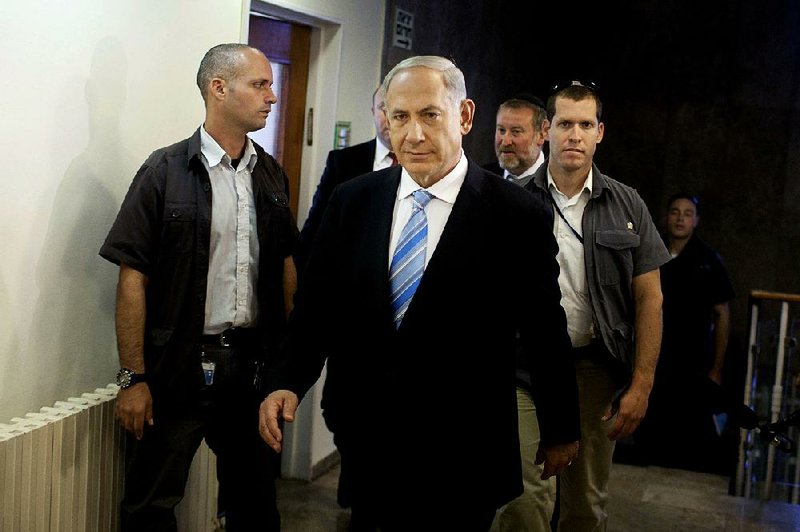JERUSALEM - Israel agreed Sunday to release 26 long-serving Palestinian prisoners as part of a U.S.-brokered deal that led to the resumption of Mideast peace talks.
The Cabinet vote set into motion the second leg of prisoner releases agreed upon before Israel and the Palestinians renewed long-frozen peace negotiations in August. At the same time, Prime Minister Benjamin Netanyahu is planning on approving new settlement construction to appease hard-liners who oppose the release.
The Jewish Home party,which opposes the creation of a Palestinian state, tried to derail the release with a bill prohibiting the freeing of prisoners convicted in attacks on Israelis. The faction, the government’s third largest, also stirred a heated debate with a barb at Israel’s chief negotiator.
Cabinet ministers Sunday rejected the bill, which Finance Minister Yair Lapid deemed “very irresponsible and designed to score public-relations points,” according to an emailed statement. Lapid’s Yesh Atid, the coalition’s second-biggest partner, supports the prisoner release and a peace agreement that would include a Palestinian state.
“We want to reach a peace agreement with the Palestinians,” Netanyahu said at Sunday’s weekly cabinet meeting, according to a text message from his office. “In this agreement, we will insist on the vital interests of the State of Israel, first of all security, of course, and including our ability to continue defending our eastern border.”
The fate of Palestinian prisoners stirs strong emotions on both sides, highlighting the competing narratives of the conflict. Many of those to be freed were involved in killing Israelis.
Most Palestinians view the prisoners as heroes, regardless of their acts, arguing they made personal sacrifices in the struggle for independence. Most Israelis view them as terrorists for targeting civilians.
In all, 104 Palestinian prisoners are to be released in four stages during the nine months set aside for Israeli-Palestinian negotiations.
The vote followed an Israel announcement that it will soon advance new West Bank settlement construction plans - highlighting an apparent settlements-for-prisoners trade-off that got both sides back to peace talks after a five year freeze.
The Palestinians consider settlements a major obstacle to establishing a state that includes the West Bank and east Jerusalem, territories Israel captured from Jordan in the 1967 war. Israel has built dozens of settlements since that are now home to about 550,000 Israelis.
The Cabinet announcement said all the prisoners have served more than 19 years and their crimes preceded the beginning of Israeli-Palestinian peace talks in 1993. A government statement said 21 of the prisoners will be released to the West Bank and the other five to Gaza.
The actual release of the prisoners will take place at least 48 hours after their names are published to give bereaved Israeli families the opportunity to appeal their release before the courts, which rarely intervene in such cases.
Israel insists that any prisoner who resumes hostile activity will be arrested and incarcerated to serve the remainder of his sentence.
Also Sunday, Israel said that it would attend a United Nations review of its human rights record this week in Geneva.
On Jan. 29, Israel became the first country to boycott a review in protest of what it said was bias at the U.N. Human Rights Council, which often criticizes its policies toward the Palestinians.
Foreign Ministry spokesman Yigal Palmor did not say whether the decision to attend the review was reached after Israel secured concessions from “friendly countries.” The review at the 47-member council will take place on Tuesday.
The left-leaning newspaper Haaretz said Israel wanted to limit the use of the council’s Article 7, which stipulates that every conference must include a separate discussion of the Jewish state’s human rights record - a requirement made of no other U.N. member.
The newspaper added that German Foreign Minister Guido Westerwelle had sent a letter to Prime Minister Benjamin Netanyahu warning him that boycotting the review would inflict “severe diplomatic damage” on Israel.
U.N. member states periodically undergo human rights reviews. The West is worried that Israel’s refusal to attend would have encouraged other nations to do the same.
In other news, an Israeli official says the prime minister has directed government ministries to stop distributing a survey that asked sensitive questions about relations between American Jews and Israel.
Israeli consulates in the United States helped distribute the questionnaire to thousands of American Jews and Israelis living in the U.S. The survey, done in partnership with two American Jewish groups, asked questions about issues such as where their loyalties lay and what they thought about pro-Israel lobbying in Washington.
The official said Sunday that Prime Minister Benjamin Netanyahu ordered the survey stopped. He spoke on condition of anonymity as he was not authorized to publicly discuss internal government decisions.
Information for this article was contributed by Aron Heller of The Associated Press; by Calev Ben-David of Bloomberg News; and by staff members of the Deutsche Presse-Agentur.
Front Section, Pages 1 on 10/28/2013

